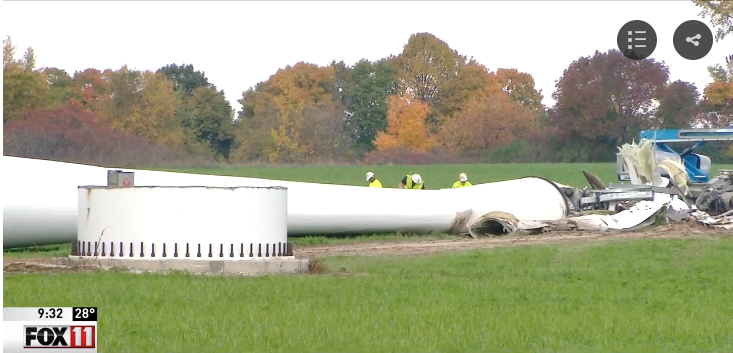Illinois Farm Bureau: Know Your Rights When Considering Wind or Solar Agreements
Wind and solar special interest groups often tout these energy sources as a boon to rural America by giving farmers another “crop” to grow, but there has been growing pushback against wind and solar from farmers and landowners across the country, from California to Illinois, Iowa, and Minnesota.
In Illinois, the Vermilion County Farm Bureau is helping to educate members so they do not get taken advantage of by wind and solar developers who present one-sided agreements.
According to WCIA news;
VERMILION COUNTY, Ill. (WCIA) — If wind or solar farm developers want to build on your property, the Illinois Farm Bureau says don’t rush into signing a contract.
The Vermilion County Farm Bureau hosted a virtual meeting Monday on how landowners can protect their rights when considering a developer’s proposal.
The virtual meeting was prompted by a proposed wind facility near Georgetown, Illinois.
“Laura Harmon, Associate Counsel for the Illinois Farm Bureau, spoke at Monday’s meeting. She says the Bureau routinely provides educational presentations to landowners throughout the state.
Discussion topics include county zoning, protections under state law, lease terms, suggestions for what landowners should look out for in the contract, and how property owners can be adequately compensated for rights they are giving away.”
Without proper representation, farmers and landowner can be taken advantage of by these lease agreements:
“These are very complex agreements drafted by the wind or solar farm companies, and as I would expect, they are one-sided,” Harmon says. “The goal of any landowner is to negotiate changes to the agreement so that they’re protected.
“For example, companies routinely, in nearly every lease that I’ve seen, will have the unilateral right to decide where facilities are going to be located. This can be problematic for landowners that have a home, especially an occupied home on their property.”
“I’m not just talking about in the case of a wind farm, a turbine,” Harmon says. “These projects require roads to be built, transmission lines. The company may want to put a substation on your property — in that situation I’d recommend that you negotiate a separate agreement for the sale of the property as opposed to a lease.
“These agreements give companies several easements. You’d be giving a company easement to access your property at any time to construct the project and maintain the project.”
Another reason landowners must be vigilant is because wind developers can talk up the financial benefits of having a wind turbine on their property, but their lease agreements seldom say whether the company will actually build a turbine on your property, or whether the land will be used for access roads, substations and transmission lines, which means farmers would receive far less compensation.
“No one is guaranteed a wind turbine,” she says, “and in many cases, the majority of compensation is tied to the construction of a wind turbine on the property. So there are ways to deal with that to make sure you are getting compensated for all the other rights you are giving up — even though you are not getting a wind turbine on your property.”
The Farm Bureau also cautioned landowners that many contracts proposed by wind companies don’t offer to reclaim the farmland or force the wind company to repair damages to drain tiles or other agricultural equipment.
“Harmson always cautions property owners to include terms of an agricultural mitigation agreement — she says this ensures farmland and its soil tiles are restored after construction.
“Part of the reason it was developed is because none of these agreements contain protections — robust protections — that require companies to, for example, repair tile lines in the manner that they should be repaired and to actually de-compact the soil so that you can continue to farm after the project is constructed or decommissioned.”
Additionally, she advises that you include terms that require the company to decommission the farm once it reaches the end of its usable life.”
Making sure wind companies clean up their mess by decommissioning and restoring the soil is absolutely necessary to preserve the long-term value of the land. This is especially true because wind turbines only last 20 years. After that period, they are no longer useful.

These agreements can also limit a farmer’s ability to build new buildings on their own land, even if it is necessary to make their farm more profitable.
“She says farmers should also look out for limitations on building additional structures on their land — in the case of wind farms, you may not be able to interfere with the flow, speed, or direction of winds.
Harmon says if you plan on adding a grain bin to a farming operation, you’d want to include that in your contract.”
Having grown up on a family farm in rural Wisconsin, I can say some of these provisions are absolutely necessary for anyone who farms for a living to build into their contract. My dad would not be pleased if he was told, after the fact, that he no longer had the right to build a new grain bin on the farm or a new shed for livestock or equipment.
Anyone who is approached by a wind company should also probably have a clause in the contract that forces the company to pay for any crops lost if a blade falls off the turbine, which has happened multiple times this year in Iowa.